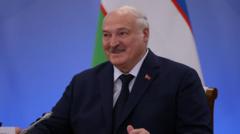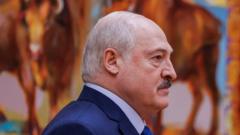Protests erupt in Indonesia against President Jokowi's attempts to elevate his sons to political power, overshadowing his achievements during a transformative decade in office.**
Joko Widodo's Tenure Leaves Indonesia Divided**

Joko Widodo's Tenure Leaves Indonesia Divided**
As President Joko Widodo's era concludes, Indonesia faces turmoil over his alleged democratic backslide.**
The tenure of President Joko Widodo, who is set to step down on Sunday after a decade, is marking a contentious chapter in Indonesia’s contemporary history. Widodo, commonly referred to as Jokowi, is credited with significant strides in poverty alleviation across Indonesia’s vast population of 280 million. Nonetheless, his leadership has become increasingly polarizing amid accusations of undermining the democratic principles that enabled his rise.
Recent protests, sparked by an “emergency warning,” reflect citizens' fears for their democracy, which emerged from decades of dictatorship less than 30 years ago. Thousands took to the streets in August, some even storming Parliament in a show of outrage against what they perceived as Jokowi's attempts to install a political dynasty.
Critics argue that during his rule, Jokowi has sought to manipulate the laws to benefit his family. Notably, a Constitutional Court ruling last year allowed his son, Gibran Rakabuming Raka, to run for vice-presidency, ultimately winning the election with Jokowi’s chosen successor, Prabowo Subianto, a former general connected to allegations of human rights violations. Further infuriating the public, proposals emerged in August regarding Jokowi's younger son, Kaesang Pangarep, pursuing a political position, contradicting Jokowi's prior statements against nepotism.
Amidst escalating tensions, protests in Jakarta positioned Jokowi at the center of vitriolic rebuke, with social media users invoking his birth name, Mulyono, as a form of scorn. This demonstrates not just an opposition to his political maneuvers but also a deeply personal dissociation from a leader whose promises of reform now seem hollow in the eyes of many Indonesians.
Recent protests, sparked by an “emergency warning,” reflect citizens' fears for their democracy, which emerged from decades of dictatorship less than 30 years ago. Thousands took to the streets in August, some even storming Parliament in a show of outrage against what they perceived as Jokowi's attempts to install a political dynasty.
Critics argue that during his rule, Jokowi has sought to manipulate the laws to benefit his family. Notably, a Constitutional Court ruling last year allowed his son, Gibran Rakabuming Raka, to run for vice-presidency, ultimately winning the election with Jokowi’s chosen successor, Prabowo Subianto, a former general connected to allegations of human rights violations. Further infuriating the public, proposals emerged in August regarding Jokowi's younger son, Kaesang Pangarep, pursuing a political position, contradicting Jokowi's prior statements against nepotism.
Amidst escalating tensions, protests in Jakarta positioned Jokowi at the center of vitriolic rebuke, with social media users invoking his birth name, Mulyono, as a form of scorn. This demonstrates not just an opposition to his political maneuvers but also a deeply personal dissociation from a leader whose promises of reform now seem hollow in the eyes of many Indonesians.




















